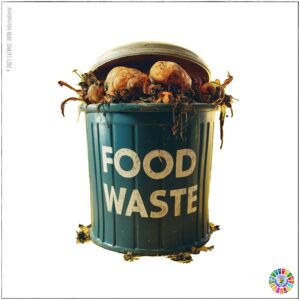FOOD WASTE ACTIVISM
Raising awareness about food waste is crucial, as it is a significant global issue with environmental, economic, and social implications. Here are several activist actions that can help highlight the problem and promote change:
1. Community Education Campaigns
- Workshops and Seminars: Organize events to educate the community on the importance of reducing food waste and provide practical tips on food storage, meal planning, and using leftovers.
- School Programs: Develop educational programs for schools to teach children about food waste, its impacts, and how they can help reduce it.
2. Social Media Campaigns
- Hashtag Movements: Create and promote a hashtag (#ReduceFoodWaste, #FoodRescue, etc.) to spread awareness and encourage people to share their food-saving tips and experiences.
- Influencer Partnerships: Collaborate with influencers and food bloggers to reach a wider audience with messages about reducing food waste.
3. Food Rescue Initiatives
- Food Donation Drives: Partner with local businesses, farmers, and supermarkets to collect surplus food and distribute it to food banks and shelters.
- Community Fridges: Set up community fridges where people can donate excess food and others in need can take it.
4. Awareness Events
- Food Waste Banquets: Host events where meals are prepared using food that would otherwise go to waste. Use these events to educate attendees about food waste.
- Zero-Waste Challenges: Organize competitions or challenges where participants commit to producing zero food waste for a week or month, sharing their progress online.
5. Advocacy and Policy Change
- Petitions: Start petitions to urge local governments to implement policies that reduce food waste, such as tax incentives for businesses that donate surplus food.
- Lobbying: Engage with policymakers to support legislation that promotes food waste reduction, such as standardized date labeling or food donation liability protections.
6. Partner with Businesses
- Retail Partnerships: Work with grocery stores and restaurants to implement food waste reduction strategies, such as discounting near-expiry products and offering smaller portion sizes.
- Corporate Challenges: Encourage businesses to conduct food waste audits and commit to reducing waste through better inventory management and employee training.
7. Media Outreach
- Documentaries and Films: Screen documentaries like “Wasted! The Story of Food Waste” and “Just Eat It” to highlight the issue and spark discussion.
- Press Releases and Articles: Write articles and press releases for local newspapers and online platforms to raise awareness about food waste in your community.
8. Creative Campaigns
- Art Installations: Create visual displays using food waste to draw attention to the issue. For example, build sculptures from discarded fruits and vegetables and display them in public spaces.
- Photography Exhibits: Curate photo exhibits that showcase the journey of food from farm to landfill, emphasizing the waste along the way.
9. Educational Resources
- Cookbooks and Recipes: Develop and distribute cookbooks with recipes for using leftovers and often-discarded parts of food, like stems and peels.
- Infographics and Flyers: Create easy-to-understand infographics that highlight key statistics about food waste and tips for reducing it. Distribute these online and in print.
10. Community Gardens and Composting Programs
- Urban Gardens: Establish community gardens where residents can grow their own food, learn about sustainable practices, and reduce reliance on store-bought items that might go to waste.
- Composting Workshops: Teach people how to compost food scraps, turning waste into valuable fertilizer for local gardens.
By implementing these actions, activists can effectively raise awareness about food waste and inspire individuals and communities to take meaningful steps towards reducing it.




